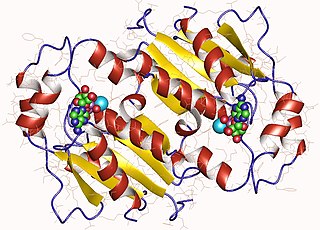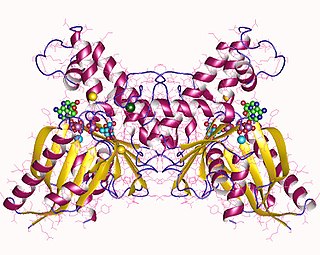| glycerate kinase | |||||||||
|---|---|---|---|---|---|---|---|---|---|
| Identifiers | |||||||||
| EC no. | 2.7.1.31 | ||||||||
| CAS no. | 9026-61-3 | ||||||||
| Databases | |||||||||
| IntEnz | IntEnz view | ||||||||
| BRENDA | BRENDA entry | ||||||||
| ExPASy | NiceZyme view | ||||||||
| KEGG | KEGG entry | ||||||||
| MetaCyc | metabolic pathway | ||||||||
| PRIAM | profile | ||||||||
| PDB structures | RCSB PDB PDBe PDBsum | ||||||||
| Gene Ontology | AmiGO / QuickGO | ||||||||
| |||||||||
| Glycerate kinase | |||||||||||
|---|---|---|---|---|---|---|---|---|---|---|---|
| Identifiers | |||||||||||
| Symbol | Glyc_kinase | ||||||||||
| Pfam | PF02595 | ||||||||||
| InterPro | IPR004381 | ||||||||||
| |||||||||||
In enzymology, a glycerate kinase (EC 2.7.1.31) is an enzyme that catalyzes the chemical reaction
- ATP + (R)-glycerate ADP + 3-phospho-(R)-glycerate
- or
- ATP + (R)-glycerate ADP + 2-phospho-(R)-glycerate
Thus, the two substrates of this enzyme are ATP and (R)-glycerate, whereas its two products are ADP and either 3-phospho-(R)-glycerate or 2-phospho-(R)-glycerate. [1]
This enzyme belongs to the family of transferases, specifically those transferring phosphorus-containing groups (phosphotransferases) with an alcohol group as acceptor. The systematic name of this enzyme class is ATP:(R)-glycerate 3-phosphotransferase. Other names in common use include glycerate kinase (phosphorylating), D-glycerate 3-kinase, D-glycerate kinase, glycerate-3-kinase, GK, D-glyceric acid kinase, and ATP:D-glycerate 2-phosphotransferase. This enzyme participates in 3 metabolic pathways: serine/glycine/threonine metabolism, glycerolipid metabolism, and glyoxylate-dicarboxylate metabolism.
This enzyme had been thought to produce 3-phosphoglycerate, but some glycerate kinases produce 2-phosphoglycerate instead. [1]









